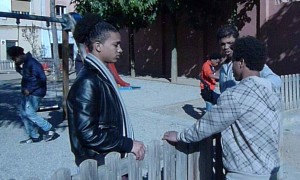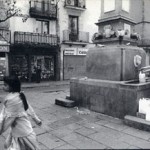
[/caption]
Zoning means that some parts of the city, for real estate or urbanistic reasons, are devoted to certain groups of population: if there are neighborhoods where immigrants live, it's obvious that the schools of these neighborhoods have to cope with much more children born from foreigners. Such is the situation in
Torpignattara, in the
east periphery of Rome: a primary school is undergoing a series of public debates abounding in words like
"ghetto", "emergency", "alarm", "banlieue". While right and left-wing politicians declare themselves worried for the school's "italianity", its teachers are carrying out their work
worthy of the best italian pedogogical tradition, using diversity as a resort to supply to the massive cuts and decadence of public education.
Until when they will call them "foreigners"? Rome is changing, and while some use this transformation to boost war among the poor,
others understood its potential to come through the cultural and political stagnation of the so-called "Italian society".

 Los Kitasellos is the name of one of the youth groups in the outskirts of Barcelona with which anthropologist Luca Giliberti (University of Lleida – FPU-ME researcher) is doing his fieldwork. Freeing themselves from the mark ("quitarse el sello") of being different, means for many young Dominicans in L'Hospitalet de Llobregat resisting against the stigma with which they are labelled, even by the institutions - in political campaigns, constant police raids, newspapers always in search of Hispanic gangs - and convert this discrimination in an emblem of black identity.
Los Kitasellos is the name of one of the youth groups in the outskirts of Barcelona with which anthropologist Luca Giliberti (University of Lleida – FPU-ME researcher) is doing his fieldwork. Freeing themselves from the mark ("quitarse el sello") of being different, means for many young Dominicans in L'Hospitalet de Llobregat resisting against the stigma with which they are labelled, even by the institutions - in political campaigns, constant police raids, newspapers always in search of Hispanic gangs - and convert this discrimination in an emblem of black identity.  [/caption]
Zoning means that some parts of the city, for real estate or urbanistic reasons, are devoted to certain groups of population: if there are neighborhoods where immigrants live, it's obvious that the schools of these neighborhoods have to cope with much more children born from foreigners. Such is the situation in Torpignattara, in the east periphery of Rome: a primary school is undergoing a series of public debates abounding in words like
[/caption]
Zoning means that some parts of the city, for real estate or urbanistic reasons, are devoted to certain groups of population: if there are neighborhoods where immigrants live, it's obvious that the schools of these neighborhoods have to cope with much more children born from foreigners. Such is the situation in Torpignattara, in the east periphery of Rome: a primary school is undergoing a series of public debates abounding in words like 